For the 2025 school year, there are 2 public elementary schools serving 234 students in Wolverine Community School District. This district's average elementary testing ranking is 3/10, which is in the bottom 50% of public elementary schools in Michigan.
Public Elementary Schools in Wolverine Community School District have an average math proficiency score of 10% (versus the Michigan public elementary school average of 34%), and reading proficiency score of 33% (versus the 44% statewide average).
Minority enrollment is 15% of the student body (majority Hispanic and American Indian), which is less than the Michigan public elementary school average of 38% (majority Black).
Overview
This School District
This State (MI)
# Schools
2 Schools
2,544 Schools
# Students
234 Students
953,641 Students
# Teachers
16 Teachers
58,885 Teachers
Student : Teacher Ratio
15:1
15:1
District Rank
Wolverine Community School District, which is ranked within the bottom 50% of all 851 school districts in Michigan (based off of combined math and reading proficiency testing data) for the 2021-2022 school year.
The school district's graduation rate of 60-79% has decreased from 80% over five school years.
Overall District Rank
#661 out of 866 school districts
(Bottom 50%)
(Bottom 50%)
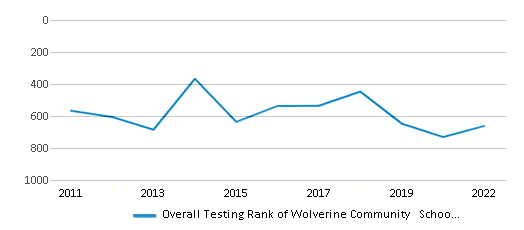
Math Test Scores (% Proficient)
10-14%
34%
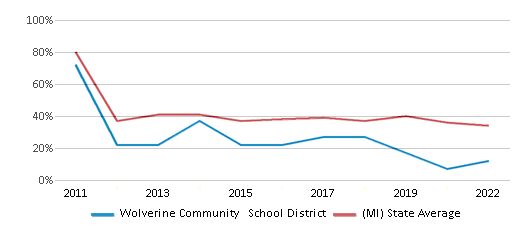
Reading/Language Arts Test Scores (% Proficient)
30-34%
45%
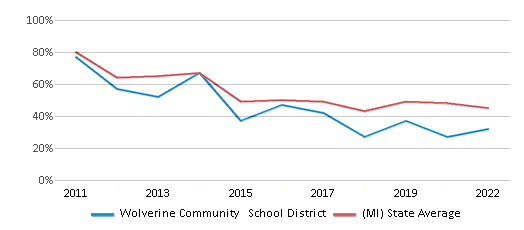
Science Test Scores (% Proficient)
30-34%
38%
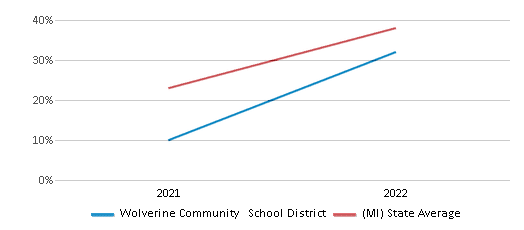
Graduation Rate
60-79%
81%
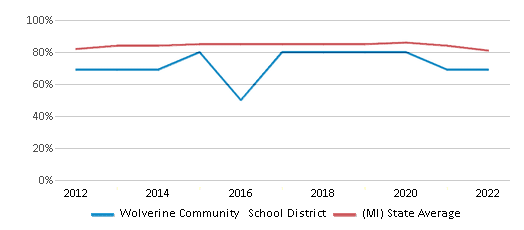
Students by Ethnicity:
Diversity Score
0.27
0.57
# American Indian Students
6 Students
6,574 Students
% American Indian Students
3%
1%
# Asian Students
1 Student
35,670 Students
% Asian Students
1%
4%
# Hispanic Students
8 Students
87,214 Students
% Hispanic Students
3%
9%
# Black Students
2 Students
176,246 Students
% Black Students
1%
18%
# White Students
199 Students
592,590 Students
% White Students
85%
62%
# Hawaiian Students
1 Student
812 Students
% Hawaiian Students
n/a
n/a
# Two or more races Students
17 Students
53,732 Students
% of Two or more races Students
7%
6%
Students by Grade:
# Students in PK Grade:
-
-
# Students in K Grade:
15
106,334
# Students in 1st Grade:
19
100,790
# Students in 2nd Grade:
20
102,777
# Students in 3rd Grade:
21
100,401
# Students in 4th Grade:
24
101,847
# Students in 5th Grade:
11
101,136
# Students in 6th Grade:
15
102,120
# Students in 7th Grade:
20
90,984
# Students in 8th Grade:
22
87,683
# Students in 9th Grade:
18
14,722
# Students in 10th Grade:
19
14,342
# Students in 11th Grade:
14
13,967
# Students in 12th Grade:
16
14,500
# Ungraded Students:
-
2,038
District Revenue and Spending
The revenue/student of $15,085 in this school district is less than the state median of $18,510. The school district revenue/student has grown by 8% over four school years.
The school district's spending/student of $12,936 is less than the state median of $17,693. The school district spending/student has grown by 8% over four school years.
Total Revenue
$4 MM
$25,476 MM
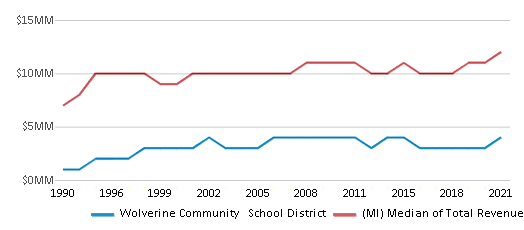
Spending
$3 MM
$24,351 MM
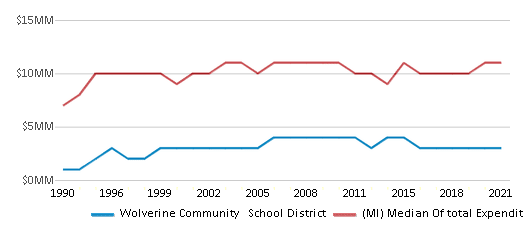
Revenue / Student
$15,085
$18,510
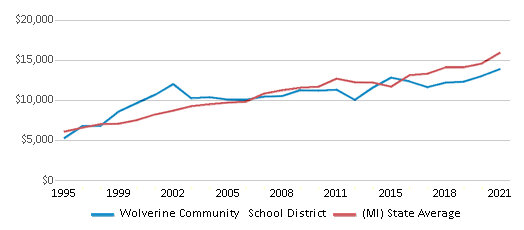
Spending / Student
$12,936
$17,693
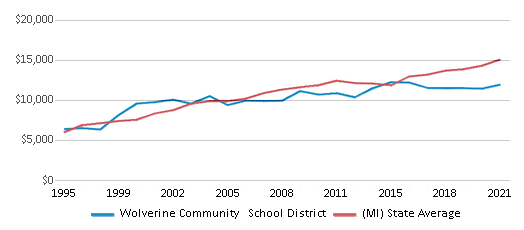
Best Wolverine Community School District Public Elementary Schools (2025)
School
(Math and Reading Proficiency)
(Math and Reading Proficiency)
Location
Grades
Students
Rank: #11.
Wolverine Elementary School
(Math: 11-19% | Reading: 30-39%)
Rank:
Rank:
3/
Bottom 50%10
5993 W Sholes St
Wolverine, MI 49799
(231) 525-8201
Wolverine, MI 49799
(231) 525-8201
Grades: K-6
| 110 students
Rank: #22.
Wolverine Middlehigh School
(Math: 6-9% | Reading: 30-34%)
Rank:
Rank:
2/
Bottom 50%10
13131 Brook St
Wolverine, MI 49799
(231) 525-8201
Wolverine, MI 49799
(231) 525-8201
Grades: 6-12
| 124 students
Recent Articles

Sexual Harassment at Age 6: The Tale of a First Grade Suspension
A six-year old in Aurora, Colorado, was suspended after singing an LMFAO song to a little girl in his class and reportedly “shaking his booty.” We look at the case and the sexual harassment problem in public schools today.

How Scaffolding Could Change the Way Your Child Learns
This article explores the concept of instructional scaffolding, a teaching method that enhances learning by breaking down complex tasks into manageable parts. It highlights how scaffolding supports students in developing critical thinking skills and becoming more independent learners. The article discusses the benefits of scaffolding, including improved engagement and reduced anxiety, and provides strategies for its implementation across various educational levels.

February 05, 2025
Understanding the U.S. Department of Education: Structure, Impact, and EvolutionWe explore how the Department of Education shapes American education, from its cabinet-level leadership to its impact on millions of students, written for general audiences seeking clarity on this vital institution.





